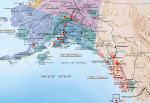Welcome to Skagway, start of the gold rush trail. In 1898, word came down to San Francisco that there was massive amount of gold being found in Alaska, so people rushed up to Skagway to start their journey over the White Pass into Canada to get rich. Canadian officials insisted that all prospectors carry 2,000 lbs of goods (food and equipment) with them, as the first prospectors were starving over the mountain, with not enough food to get them through the winter. As many prospectors couldn’t afford horses/mules, they had to carry their weight to the scales on their back, taking 50-75lbs at the time, and doubling back every 5-10 miles to grab more. After climbing for months over the White Pass on either the Chilkoot or White Pass trails, they then had to build a raft and float another 500+ miles to where the gold was found. The only problem was, by the time they got there, all of the land had been staked out by prospectors before them, and there was no gold left for them. Most either stayed to work for someone else or trudged back over the harsh pass to return home empty-handed.
Out of this gold rush, however, came some innovation that continues to this day. A cobbler from Boston heard about the gold rush and came out to become rich. After figuring out that wasn’t happening, he noticed that many of his fellow climbers did not have the right shoes for climbing snowy mountains. He opened a shop in Skagway selling shoes, and that’s how Mr. Nordstrom started his chain of shoe stores (now department stores). Another prospector saw the ridiculous ways that equipment was being carried up the mountain and decided to start a company focusing on compartmentalized shipping. Mr. Mack’s trucks and containers became the industry standard for shipping/transportation. Finally, two other prospectors decided to help their fellow gold rushers by giving them some sturdy pants to climb the harsh trail in. Hence, Mr. Levi and Mr. Strauss’s jeans company was founded in Skagway.
While Ketchikan and Juneau did not start off as commercial towns, today’s commercialized Skagway fits into the history of this small town. Only 800 permanent residents (with another 2000 summer workers), and each day 8,000-12,000+ cruise ship passengers surge into this little town, buying trinkets, riding the White Pass Railroad, and otherwise enjoying the beautiful scenery. Since Skagway is part of the Klondike National Monument, it’s the most visited National Park in the U.S. (they get to count every passenger on every cruise ship that stops there, even if they don’t get off the boat)
We had our first hard rain of the trip when we docked in Skagway, so Beth and I bundled up in our warmest waterproof gear and headed out to ride bikes down the White Pass highway. The biking company gave us and our 12 other crazy companions rain pants/parkas, and away we went, flying 15 miles down the road, through US Customs. We didn’t think a few of the people on our tour would make it (one lady in particular threw up twice at the top of the summit - we really didn’t believe she’d end up on a bike, but rather would ride back down in the van), but we all made it down safe, sound, and soaked. The rain gear protected our bodies well, but our heads, hands and feet were all quite wet. (Beth's camera has the pics, so as soon as I can connect for pictures, I'll add those in - her camera hasn't worked quite as well ever since getting a tad bit wet on the bike trip)
We headed back to the Millennium to dry off a bit, and by the time we headed out for our Hike and Float, the rains had stopped and the clouds had lightened. Mom and Dad took off for a bus tour of Skagway and the White Pass. Our hike was very informative (with one of the most knowledgeable guides I’ve ever had), and after a few hours of hiking, we got into our raft back to Skagway, and the sun came out. We walked through town on the way back to our boat, enjoying the wooden sidewalks and restored buildings from the gold rush era.
Subscribe to:
Post Comments (Atom)


1 comment:
very informed sarah! sounds like a great trip!!
Post a Comment